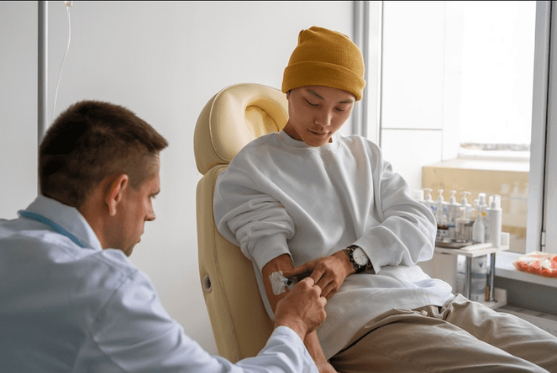Menopausal hormone therapy is linked to an increased risk of dementia, according to a recent case-control research, however the findings are not very applicable to contemporary clinical practice.

It is estimated that over 55 million people worldwide suffer with dementia, making it one of the leading causes of disability and death.¹ Even after taking into consideration that women in developed nations often live longer than males, the medical profession has long acknowledged that women are significantly more likely than men to develop dementia. Researchers Pourhadi et al. recently investigated whether hormone replacement therapy (HRT), which is therapy intended to counteract the decline in estrogen levels that occurs during menopause, might be linked to an increased risk of dementia later in life. This finding raises the possibility that estrogen or other sex hormones may play a significant role in cognitive decline.²
What they carried out
Pourhadi and colleagues carried out a case-control study due to previous observational data hinting at a potential connection between hormone therapy and dementia. They compared (HRT) usage among women diagnosed with dementia (5,589 cases) and similarly aged women without dementia (55,890 controls). The researchers identified both cases and controls from the female population of Denmark using national registries during the period from 2000 to 2018. All participants were aged 50 to 60 on January 1, 2000, and had no prior history of dementia, breast or gynecological cancer, blood clots or clotting disorders, liver disease, or any surgical procedures such as a bilateral oophorectomy or hysterectomy.
The main focus of the study was on the use of combined estrogen and progestin (E+P) in menopausal hormone replacement therapy. By utilizing data from the Danish National Prescription Registry, the researchers tracked the use of HRT starting from January 1, 1995, up until two years before the index date. For cases, this index date was either when they were diagnosed with dementia or when they began treatment, while for controls, it corresponded to when their matched case was diagnosed or started treatment.
What they discovered
Among the 5,589 reported cases of dementia, late-onset all-cause dementia accounted for 4,436 cases, or 79.4%. Additionally, Alzheimer‘s disease (AD) was recorded in 1,458 cases, representing 26.1% of the total.
The findings revealed that 1,782 cases (31.9%) and 16,154 controls (28.9%) had undergone combined E+P menopausal hormone therapy prior to the index date. A significant majority, 66.2% (11,879 individuals), had stopped using E+P for more than eight years before the index date, whereas 1,555 individuals (8.7%) were still on the therapy at that time.
When analyzing the data, it was found that those who had used the menopausal E+P treatment were 24% more likely to develop all-cause dementia compared to those who never used it, even after adjusting for confounding factors (adjusted HR: 1.24; 95% CI: 1.17-1.33). In terms of specific dementia types, the study highlighted that ever-users of the treatment were also 21% more likely to experience late-onset dementia (HR: 1.21; 95% CI: 1.12-1.30) and 22% more likely to develop Alzheimer‘s disease (HR: 1.22; 95% CI: 1.07-1.39).
Furthermore, increased durations of hormone therapy were linked to a higher risk of developing dementia. For instance, women who used E+P for less than a year had a 21% greater risk of all-cause dementia compared to those who never used it (HR: 1.21; 95% CI: 1.09-1.35). In contrast, those who used E+P for 8-12 years faced a 39% increased risk compared to never-users (HR: 1.39; 95% CI: 1.21 to 1.58). The risk was even more pronounced for women who had been on E+P for over 12 years, with a staggering 74% increase (HR: 1.74; 95% CI: 1.45-2.10). A similar trend was found for late-onset dementia, although not for dementia specifically related to AD.
In summary, these findings suggest that women utilizing menopausal hormone therapy face a greater risk of dementia compared to those who do not, and extended use of these hormones leads to an even higher risk.
Reasons to be skeptical
How do these findings influence my generally favorable opinions on menopausal (HRT)? They have no effect, as this retrospective study has several significant weaknesses, some of which the authors acknowledge themselves, ultimately making it difficult to draw any important clinical conclusions.
As often seen in observational studies, confounding factors likely influenced the outcomes. The cases were much more prone than the control group to live alone, have lower education and income levels, and suffer from conditions such as hypertension, diabetes, and thyroid disorders, all of which are recognized risks for dementia. Although the authors considered these factors in their statistical evaluations, they likely represent just a few of many differences between the groups. From these stated disparities, we can conclude that the control group probably enjoyed better overall health and practiced more health-conscious habits that would lower their dementia risk independently, like exercising and keeping lower cholesterol levels. Such confounding variables likely explain why women with minimal exposure to HRT (specifically, those on it for less than a year) still exhibited a significantly higher risk for dementia. In fact, the risk for women using estrogen plus progesterone for less than a year surpassed that of women using it for one to four years or four to eight years.
Moreover, there are reasons to question the reliability of certain aspects of Poudhari et al.’s data. For example, information regarding the use of hormone therapy, including its duration, type, and dosage, was derived from filled prescriptions; however, a filled prescription does not guarantee that the medication was actually taken, which could lead to inaccuracies in the analysis that followed. We should also be wary of the AD diagnosis data since Alzheimer’s cases were likely underreported in this group. Although Alzheimer’s accounts for an estimated 60-80% of dementia cases globally, it only represented 26% in this study—a disparity the authors note indicates incomplete data on dementia diagnoses within health records. Consequently, this limitation renders any reported links between HRT and Alzheimer’s disease essentially invalid.
The bottom line
In their case-control research, Pourhadi and colleagues aimed to explore the effects of combined estrogen and progestin therapy on dementia risk in women going through menopause. Although their findings indicated an increased risk of all types of dementia, late-onset dementia, and Alzheimer’s disease associated with hormone treatment, these outcomes were likely skewed by confounding factors. This means we cannot draw any strong conclusions about whether hormone therapy actually causes the observed link. Additionally, the hormone formulations taken by many participants in this study do not reflect those that are more commonly prescribed today, leaving us without insights on the current relationship between HRT and dementia.
I have emphasized on my podcast how many women have missed out on the benefits of HRT over the years due to seriously flawed studies linking it to various diseases. I truly hope that the findings from Pourhadi and his team do not further discourage HRT use. This research highlights that concerns around HRT are often based on misleading links that don’t hold relevance in today’s medical practices, while the clear and substantial advantages of HRT for menopausal women remain well-documented.
Notice: The content of this blog serves only as general information and should not be seen as professional medical, nursing, or any health care services. It does not establish any doctor–patient connections. Any information used from this blog or its linked resources is the sole responsibility of the reader. This blog’s content is not designed to replace expert medical advice, diagnosis, or treatment. If you have any medical issues, you should not ignore or postpone seeking medical advice, and it is important to consult your healthcare providers for assistance with these matters.




